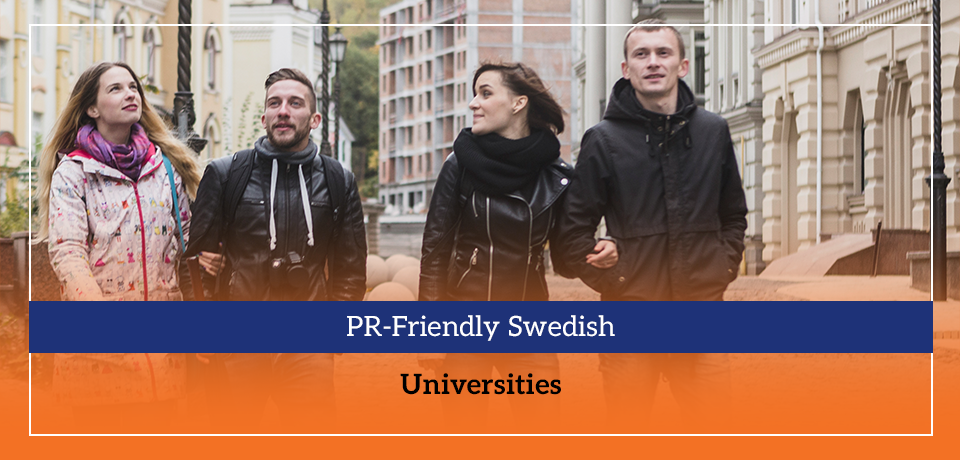Sweden is one of the nicest places for international students. It has top universities, a strong job market, and a high quality of life. But what happens after graduation? Many students want to stay and build a future here.
Getting permanent residency (PR) in Sweden can be a long process. But if you plan well, it becomes easier. Sweden offers clear pathways for graduates. You can work, settle, and even become a citizen over time.
So, how to get PR in Sweden after study? We’ll explain everything here in this guide. You’ll learn why Sweden is a great choice, the PR benefits, the latest 2025 policy updates, and the best application methods. Let’s start!
Why Sweden? PR Benefits for International Graduates in 2025
Sweden is one of the best places to live and work. It has a strong economy, a great work-life balance, and a welcoming society. Many international graduates choose to stay after completing their studies.
Great Work-Life Balance
Sweden values both work and personal life. People do not work too many hours. The average workweek is around 40 hours, and overtime is rare. Employees also get many benefits like paid vacation, parental leave, and flexible work options.
A Friendly and Inclusive Society
Sweden is known for being open to people from different cultures. English is widely spoken, so you don’t need to know Swedish immediately. However, learning the language can help in the long run, especially for jobs and PR applications.
Pathways to Citizenship
Getting PR is an important step toward Swedish citizenship. After having PR for five years, you can apply for citizenship. Sweden allows dual citizenship, so you don’t have to give up your original nationality.
Job Opportunities for International Graduates
Many international students find jobs in Sweden after graduation. A report shows that about 67% of international graduates secure jobs in Sweden within a year. The country has a strong demand for skilled workers, especially in tech, engineering, and healthcare.
Sweden vs. Other EU Countries
|
Factor
|
Sweden
|
Germany
|
Netherlands
|
France
|
|
PR Residency Period
|
4 years
|
5 years
|
5 years
|
5 years
|
|
Language Requirement
|
Not required (but helps)
|
B1 German
|
A2 Dutch
|
B1 French
|
|
Job Market Accessibility
|
High (67% job rate for graduates)
|
High
|
Medium
|
Medium
|
Sweden has one of the shortest PR residency periods in Europe. Unlike Germany or France, you do not need a language test for PR. There isn’t a specific language certificate that you must present to apply for a PR permit.
2025 Policy Updates: What’s New for PR Applicants
In 2025, Sweden introduced new rules for permanent residency (PR). These changes affect international students and workers. Let’s break down what’s new.
Does the 2025 Fast-Track PR Apply to Students?
Yes, there is a faster PR process now. But it’s mainly for skilled workers. Students must still follow the standard path.
New Salary Thresholds for Skilled Workers in Sweden
Sweden has set new salary limits for PR applicants. Skilled workers must earn a certain amount to qualify. This ensures they can support themselves. The exact figures depend on the job and industry. It’s important to check the latest numbers before applying.
Stricter Reporting Requirements
Employers now have more responsibilities. They must report job details to authorities. This ensures transparency in the hiring process. It also helps maintain fair work conditions.
Extended Residency Period for Citizenship
To become a Swedish citizen, you now need to have lived in Sweden longer. The required period has increased from five to eight years.

Pathways to PR After Graduation
Graduating in Sweden opens many doors for staying long-term. One of the most common ways is through a standard work permit. This permit allows you to work in Sweden. After working for four years, you can apply for permanent residency.
1. Get a Standard Work Permit
A standard work permit is for those who have a job offer in Sweden. This is the easiest way to stay and work after graduation. But there are some conditions you must meet.
First, you need a valid job offer from a Swedish employer. The job must meet Sweden’s salary and work conditions rules. Your salary must be at least 13,000 SEK per month. Your employer must also provide health and life insurance from the start.
Your passport must be valid for at least two years. If it expires sooner, you may get a shorter permit. The job must also be advertised in Sweden for at least 10 days before hiring a non-EU worker.
How to Apply?
- Your employer offers you a job. They check with the labor union to ensure fair wages and conditions.
- You apply for the work permit online. Online applications are processed faster.
- Wait for approval. Processing times vary, so check updates from the Swedish Migration Agency.
- Receive your permit and start working. If you need a visa, collect your residence permit card before traveling.
Things to Keep in Mind
- Your employer must follow all Swedish labor laws when hiring you.
- You cannot start working until you get your permit approved.
- Your permit is linked to your job. If you switch jobs, you must apply for a new permit.
2. Residence Permit as a Self-Employed Person
Having a residence permit as a self-employed person is another pathway to PR after graduation in Sweden.
Requirements:
Business Plan: You need a solid business plan. This plan should explain your business idea, target market, and financial projections.
Experience: You must have experience in your business field. This includes relevant skills and knowledge to run the business successfully.
Financial Stability: You should have enough money to support yourself and your family for at least two years.
Ownership: You must own at least 50% of the business.
3. Dependent Permit
If your spouse or partner is working or studying in Sweden, you might be eligible for a dependent permit. This permit allows you to join them and live in Sweden. Let’s explore the key aspects.
Eligibility:
- You must be married, in a registered partnership, or cohabiting with the person in Sweden.
- The person (dependent) in Sweden must be able to financially support themselves and you.
- There must be adequate housing for both of you in Sweden.
4. Guest Researcher Permit
If you’re planning to conduct research in Sweden, you can apply for a guest researcher permit. This permit allows you to carry out research at a Swedish university or research institution.
Eligibility:
- Invitation from a Swedish institution: You need an invitation from a Swedish research institution.
- Proof of funding: You must show you have enough money to support yourself during your stay.
How to Apply:
- Get an invitation. The Swedish institution must invite you to conduct research.
- Submit your application. Apply online through the Swedish Migration Agency. Include your invitation and proof of funds.
- Wait for processing. Processing may take some time. The Swedish Migration Agency may ask for more documents.
- Receive your permit. If approved, you’ll get a permit to conduct your research.
Important Points:
Your spouse or children can apply for a dependent permit to join you. The research should contribute to Sweden’s academic community.
5. Doctoral Student Permit
If you want to do a Ph.D. in Sweden, you need a doctoral student permit. To be eligible, you must:
- Be accepted into a doctoral program at a Swedish university.
- Have financial proof to support yourself during your studies.
The application process is easy. First, you need an official admission letter from your university. Once you have that, you can apply online through the Swedish Migration Agency. You must submit your admission letter, proof of funding, and passport details.
6. EU Blue Card
The EU Blue Card is another great option for skilled workers. It allows you to live and work in Sweden while enjoying many benefits. This permit is specifically for highly qualified professionals who have a job offer in Sweden.
To qualify, you must:
- Have a job offer from a Swedish employer.
- Earn a high salary, at least 1.5 times the average salary in Sweden.
- Have a university degree or at least five years of work experience in your field.
To apply, you need a valid job contract. The contract should be for at least one year and meet the salary requirement. After that, you can apply online through the Swedish Migration Agency. You must submit your job contract, proof of qualifications, and passport details.
The EU Blue Card comes with many benefits. You can bring your family with you, and they can also apply for residence permits. After 33 months, you may qualify for permanent residency. But if you learn Swedish, you can apply after 21 months instead.
7. ICT (Intra-Corporate Transfer) Permit
If you work for a company that operates in Sweden and needs to transfer there, you can apply for an ICT permit. This permit allows employees to relocate within the same company for a temporary period.
There are three types of ICT permits:
- Manager permit – for high-level company managers.
- Specialist permit – for employees with expert knowledge.
- Trainee permit – for employees undergoing company training.
To qualify, you must:
- Work for a company that has offices in both your home country and Sweden.
- Have worked for the company for at least three months before applying.
- Have a job offer for a temporary role in Sweden.
ICT permits can help workers get PR, but the process is unclear. To qualify for PR, a person must hold a permit for 4 years. However, ICT permits only the last 3 years in total (2 years first, then a 1-year extension).
Right now, no one has held an ICT permit for 4 years yet. So, it is still unknown how Sweden will handle PR for these cases. If someone reaches the 3-year limit, they may need to leave Sweden and apply again from another country.

Top 5 PR-Friendly Swedish Universities (2025 Rankings)
Some universities in Sweden help students find jobs and settle in the country. They have strong career support, industry links, and helpful student services. If you plan to stay in Sweden, choosing the right university can make things easier.
1. Karolinska Institute
Karolinska Institute (KI) is famous for medical and health sciences. It has strong links with hospitals, research centers, and biotech companies. Many graduates find jobs in Sweden’s healthcare sector. This makes it easier to get a work permit.
KI offers career support to international students. They help with job searches, networking, and work permit guidance. Healthcare jobs are always in demand in Sweden. So, graduates in medicine and life sciences have high chances of getting PR.
The university also offers Swedish language courses. Learning Swedish can help students find better job opportunities. It also helps in settling in Sweden for the long term.
2. Lund University
Lund University is one of the oldest and best universities in Sweden. It has strong links with industries like technology, business, and engineering. Many international graduates find jobs in Sweden’s tech sector.
The university has a career center for international students. It helps with job applications, resume writing, and interview preparation. They also organize career fairs where students can meet employers.
Lund University offers many English-taught programs. This makes it easier for international students to study and work in Sweden. The university also provides Swedish language courses. Learning the language can improve job chances and help with long-term residency.
3. Uppsala University
Uppsala University is known for its research and innovation. It has partnerships with top companies like Ericsson, Volvo, and AstraZeneca. Many international students find jobs in these companies after graduation.
The university offers career services to help students find work. They provide internship opportunities, networking events, and job search support. The university also offers workshops on Swedish work culture.
Uppsala University has a high employment rate for international graduates. Learning Swedish is not required for PR, but it helps in getting better jobs. The university offers free Swedish courses for students.
4. KTH Royal Institute of Technology
KTH is Sweden’s top technical university. It has strong connections with engineering, IT, and energy industries. Many graduates find jobs in Sweden’s growing tech sector.
KTH offers strong career support for international students. They help with job applications, interview training, and industry networking. Many tech companies prefer hiring KTH graduates because of their strong skills.
The university also offers Swedish language courses. Learning the language can help students integrate into society. It can also make the PR process easier in the future.
5. Stockholm University
Stockholm University is well-known for social sciences, law, and business studies. Many international students find jobs in Sweden’s business and finance sectors.
The university has a career center that helps students with job applications. They also offer workshops on work permits and PR rules. This helps students understand how to stay in Sweden after graduation.
Stockholm University has a high employment rate for international students. They offer networking events where students can meet potential employers. The university also provides Swedish language courses to help students adapt.

Essential PR Requirements in 2025 (Checklist)
Gaining a PR in Sweden is a significant milestone. It allows you to live and work in Sweden indefinitely. To get this, you need to meet specific requirements. Here’s a full checklist:
- Valid Residence Permit: Ensure you hold a valid residence permit. This could be a work permit, EU Blue Card, guest researcher permit, or doctoral student permit. Time spent on student permits (bachelor’s or master’s level) typically doesn’t count toward PR.
- Duration of Stay: You need to have lived in Sweden for a combined period of four years within the past seven years on qualifying permits.
- Employment History: At least 44 months of work history during the last seven years.
- Financial Stability: You must be able to support yourself financially. This means having a stable income and not relying on welfare benefits.
- Accommodation: Having a stable and decent place to live is essential.
- Clean Criminal Record: This includes no criminal behavior or unpaid debts.
- Language Skills: While not always mandatory, having Swedish language skills can enhance your integration and may be required for certain permits.
Exceptions: If you hold a permit for doctoral studies, the time spent in Sweden will count towards permanent residence.
Avoiding Common PR Application Mistakes
Here are the most common mistakes to avoid while applying for a PR in Sweden:
Mismatched Job-Description Codes
One of the biggest reasons for rejection is incorrect or mismatched job description codes. This happens when the job title or role doesn’t match the code used in your application. The Swedish Migration Agency may not approve your application if these don’t align.
Missing or Incorrect Documents
Submitting incomplete or wrong documents is another common mistake. Missing a key document or submitting one that’s incorrect can delay the process or cause a rejection.
Not Meeting the Work History Requirement
To qualify for PR, you must have worked in Sweden for a certain number of months.
Insufficient Financial Support
You must be able to show that you can financially support yourself. Your PR application may be denied if you don’t meet Sweden’s financial thresholds.
Applying Too Late
Some applicants apply for PR too close to their residence permit’s expiration date. This can cause unnecessary delays in the process.

Frequently Asked Questions
Can I apply for PR while on a job-seeking visa?
Yes, you can. However, you must have a valid job offer and meet the requirements for residency. It’s also important to ensure that you follow all the visa conditions while applying.
Do I need a permanent contract for PR?
No, you don’t need a permanent contract for PR. A temporary contract works too, as long as Sweden’s salary and job conditions are met. The key is to have a valid job offer and work for the required time.
How does the 2025 language requirement affect my application?
In 2025, the language requirement will be stricter. If you don’t know Swedish, it could affect your PR application. Learning the language helps improve your chances. You may need a certain level of Swedish for PR approval.
Is healthcare free for PR holders?
Yes, healthcare is free for PR holders. However, you will need to register with Sweden’s social security system.
Can I study part-time while waiting for PR?
Yes, you can study part-time while waiting for PR. As long as you meet the other PR requirements, studying won’t affect your application. Just make sure you have enough time for your job or work requirements.
What’s the PR processing time in 2025?
The processing time for PR in 2025 is about 6 to 12 months. This can vary depending on your situation and the type of permit you have. Make sure to apply early to avoid delays.
Does volunteering count toward residency?
No, volunteering does not count toward residency. To qualify for PR, you need to work and meet the other requirements. Volunteering is great, but it won’t help with your PR application.
Can EU students get PR faster?
EU students may have an easier time applying for PR. They don’t need a work permit to stay in Sweden. However, they still need to meet other requirements, such as working for the required amount of time.
How to appeal a PR rejection?
The Swedish Migration Agency will provide instructions on how to appeal. You may need to submit extra documents or explain your situation more clearly.
Is dual citizenship allowed after PR?
Yes, dual citizenship is allowed after PR in Sweden. If you meet the requirements, you can hold Swedish citizenship alongside another nationality. Just check the rules with your home country’s government as well.
Conclusion
Achieving permanent residency (PR) in Sweden is a goal for many graduates. It offers the chance to live, work, and build a future in one of Europe’s most vibrant countries. However, it’s important to follow the right steps and meet the requirements. If you’re planning on applying for PR, start gathering all necessary documents early. Always check for the latest process of how to get PR in Sweden after study from the Swedish Migration Agency. Immigration laws can change, so staying updated is key.